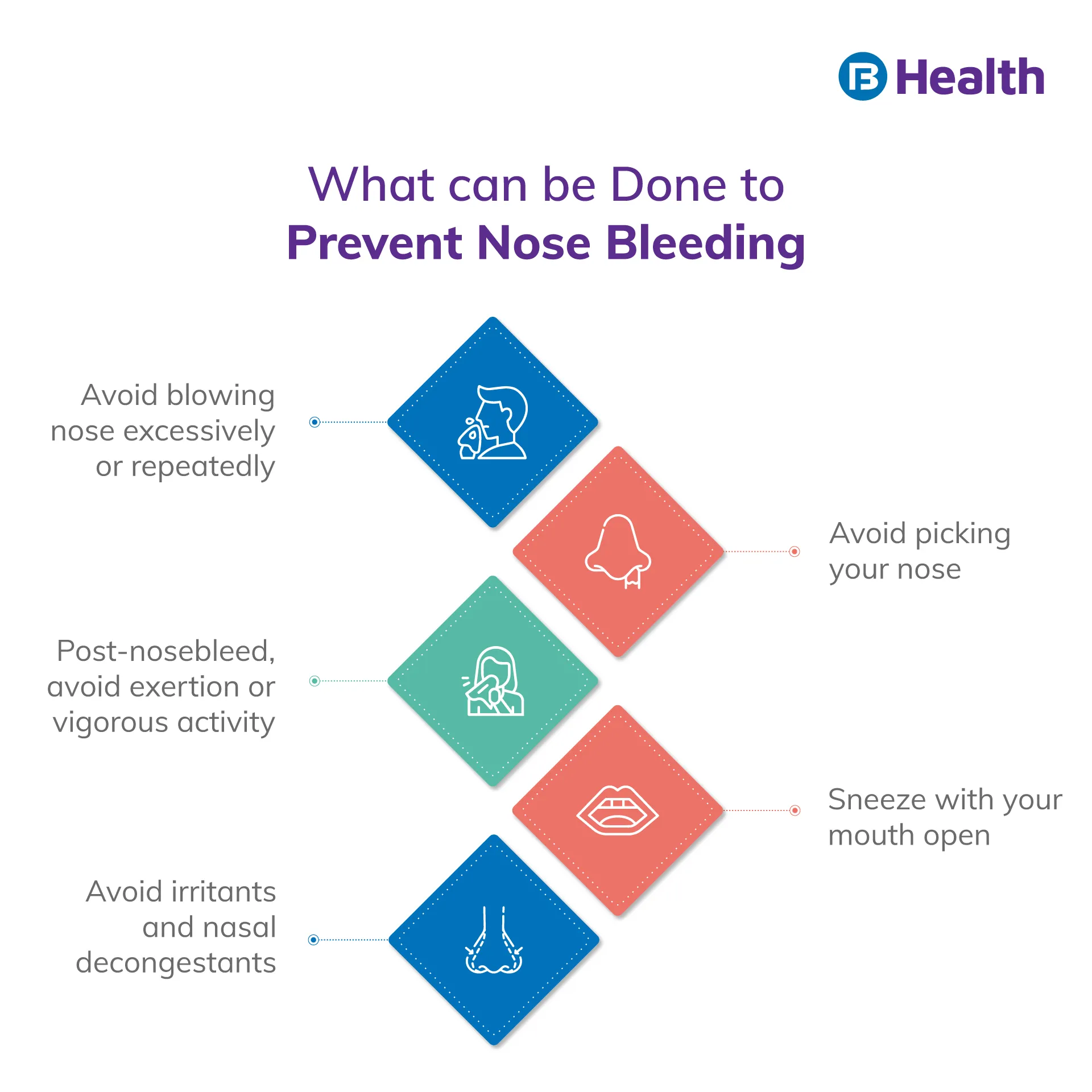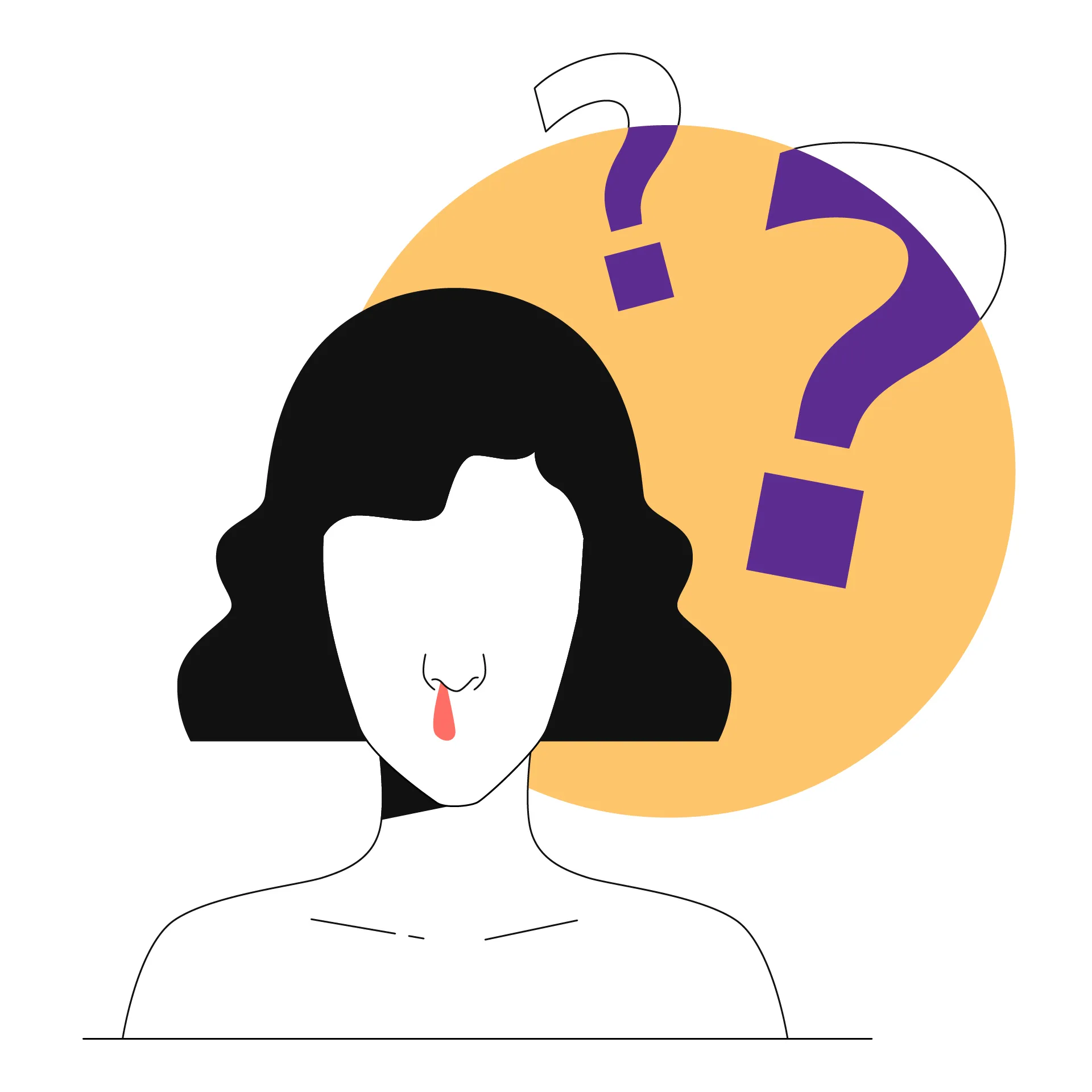ENT | 6 min read
Nosebleeds(Epistaxis): Causes, Treatment and Prevention
Medically reviewed by
- Table of Content
Synopsis
Nosebleeds can be frightening. However, they are not a serious occurrence. Although nosebleeds might strike out of the blue, most don't require medical attention and usually go away on their own. Several causes can trigger nosebleeds, but they often occur without reason. Read this blog to know more about nose bleeding and its causes and treatments.
Key Takeaways
- Many factors cause nosebleeds, but dry air and frequent picking or scratching are the main causes
- Best ways to stop nosebleeds are to keep your home's air humidified and use nasal mists to keep your nasal passages wet
- Nosebleeds are not severe. They start suddenly and end quickly
What are Nosebleeds?
When blood leaks from the tissue lining your nose, it is known as a nosebleed. The medical term for a nosebleed is Epistaxis. The nose is prone to damage and nosebleeds because of its location on the face. In addition, the significant number of blood vessels close to its lining makes it susceptible to injury and damage.
Nosebleeds can happen on their own, but they frequently have unseen causes. Despite being scary, they rarely indicate a significant medical problem. The bleeding results from the mucous membrane, a mucus-secreting tissue inside the nose, drying out, crusting, or cracking. Bleeding of the nose can also cause Parosmia, in which your sense of smell gets distorted. In their lifetime, 60% of people experience at least one nosebleed. Adults and children between the ages of three and ten frequently get nosebleeds.
Types of Nosebleeds
There are two kinds of nosebleeds, one more serious than the other:
Anterior nosebleed
An anterior nosebleed begins on the bottom portion of the wall dividing the two sides of the nose in the front of the nose called the septum. This front part of the nose has delicate capillaries and tiny blood vessels prone to breaking and bleeding. The most typical and often non-serious type of Epistaxis is this one. Children are more likely to get these nosebleeds, which can be treated at home.
Posterior nosebleed
If the bleeding is deep inside the nose, it is a posterior nosebleed. The larger blood vessels in the back, close to the throat, bleed, which is the source of this nose bleeding. Compared to an anterior nosebleed, this one may be more dangerous. It may cause significant nose bleeding that runs down the back of the throat and can result in Tonsilitis. For a nosebleed of this nature, you could require immediate medical assistance. Adults are more likely to get this kind of nosebleed.

What Causes Nosebleeds?
Nose bleeds at night and daytime are caused by typical nose bleeding reasons such as:
- Picking your nose
- Upper respiratory infections (colds) and sinusitis, particularly periods that result in sneezing, coughing, and blowing the nose
- Vigorously blowing your nose
- Stuffing something up your nose
- Damage to the face or nose
- Rhinitis that is allergic and not allergic (inflammation of the nasal lining). An infection, such as a cold or flu, that frequently results in a clogged or stuffy nose
- Blood-thinning medication (aspirin, non-steroidal anti-inflammatory drugs, warfarin, and others)
- Drugs inhaled through the nose, such as cocaine
- Reactive chemicals (chemicals in cleaning supplies, chemical fumes at the workplace, other strong odors)
- Extreme altitudes. As you ascend, the air gets thinner (short of oxygen) and drier
- A divergent septum (an abnormal wall shape that separates the two sides of the nose)
- Regular use medicines and nasal sprays to relieve runny, itchy, or stuffy noses. Antihistamines and decongestants have the potential to dry up the nasal membranes
- Dry air or a temperature rise can cause your nose to become itchy
- Allergies such as hay fever
- Ear infections
- Foreign object in the nose
- Chilly air
- Acute respiratory illness
- Protracted breathing of extremely dry or chilly air
- Antibacterial drugs
- Other less typical nose bleeding causes are as follows: Consuming alcohol.
- Bleeding illnesses such as leukemia, hemophilia, and von Willebrand disease
- Blood pressure problems.
- Atherosclerosis
- Cosmetic and nasal surgery
- Tumours or polyps in the nose.
- Hemorrhagic telangiectasia runs in families.
- Pregnancy
- Cancer or Chemotherapy
- Liver or renal condition
- Scurvy, a severe lack of vitamin C
- Enlarged heart failure
- Excessive consumption of specific herbal supplements, most frequently vitamin E and ginkgo Biloba
- Contact with harmful chemicals

Nosebleed Treatment
A doctor's first step is to stop the nose's bleeding. They might also take a person's pulse and check their blood pressure. Before proposing a proper course of therapy, they may also request an X-ray if they suspect a fracture in the nose or face. The type of nosebleed and its underlying cause will determine the course of treatment. Typical forms of nose bleeding treatment include:
Nasal packing
To provide pressure to the bleeding cause, a doctor may place ribbon gauze or specialized nasal sponges into the cavity.
Cautery
In this technique, a medical expert burns or cauterizes a section of the nasal lining to stop blood flow.
Embolization reputable source
Embolization reputable source: An ENT surgeon will embolize blood vessels or arteries with materials to stop blood flow. Any bleeding from the nose will stop with this treatment. However, this is a rare practice.
Modifications or new prescriptions for medications. Cutting back on or stopping blood thinner use can be beneficial. Additionally, blood pressure medicines can be required. A blood clotting aid called Tranexamic (Lystedaâ) may be prescribed.
Foreign body removal
The removal of a foreign body if that caused the nose's bleeding.
Septal surgery
A surgeon may fix a deviated septum if it is the source of a persistent bloody nose.
Ligation
In this surgical operation, the blood vessels or arteries responsible for the nose bleeding are located, and their ends are tied together. If alternative treatments have failed, medical experts frequently turn to nasal ligation. According to a trusted source, only 5-10% of posterior nosebleed cases require ligation.[1]
Nosebleed Prevention Tips
A person can take several steps to stop nosebleeds from occurring, including:
- Avoid picking your nose
- Stopping from blowing one's nose excessively or repeatedly
- Post-nosebleed, avoid exertion or vigorous activity
- Avoid irritants and nasal decongestants
- Sneezing with the mouth open
Nosebleeds can be avoided by maintaining moisture in the nasal lining. For instance, some people may benefit from utilizing nasal saline sprays and humidifiers at high elevations or in dry areas.
Additional Read: Yoga for SinusitisWhen should you seek help from a doctor?
Most of the time, nosebleeds will end by themselves. There are various situations where receiving medical care might be required. Call your doctor or an urgent care facility if:
- After exerting pressure for ten minutes, the nose bleeding has not stopped
- You experience dizziness or faintness
- You ingest lots of blood
- other areas of your body are bleeding or bruising
- You are taking drugs such as blood thinners or anticoagulants
- Along with the nosebleed, there is facial pain or damage
- Your nose contains a foreign object
Many people find it scary to see blood coming from their noses. The good news is that most nosebleeds can be treated at home and are usually not serious. However, if you are bleeding profusely, haven't been able to stop a nosebleed for 20 minutes, or have recently had an injury to your head, face, or nose, you should see a doctor or seek emergency medical assistance. If your nosebleeds happen frequently, schedule an appointment with your doctor.
You can take an online doctor consultation with a click on Bajaj Finserv Health. The best thing here is that you can book a teleconsultation from the comfort of your home and get all the advice you need online. With the convenience and safety this offers, you can start taking the best care of your health.
- References
- https://www.medicalnewstoday.com/articles/164823#treatment
- Disclaimer
Please note that this article is solely meant for informational purposes and Bajaj Finserv Health Limited (“BFHL”) does not shoulder any responsibility of the views/advice/information expressed/given by the writer/reviewer/originator. This article should not be considered as a substitute for any medical advice, diagnosis or treatment. Always consult with your trusted physician/qualified healthcare professional to evaluate your medical condition. The above article has been reviewed by a qualified doctor and BFHL is not responsible for any damages for any information or services provided by any third party.




